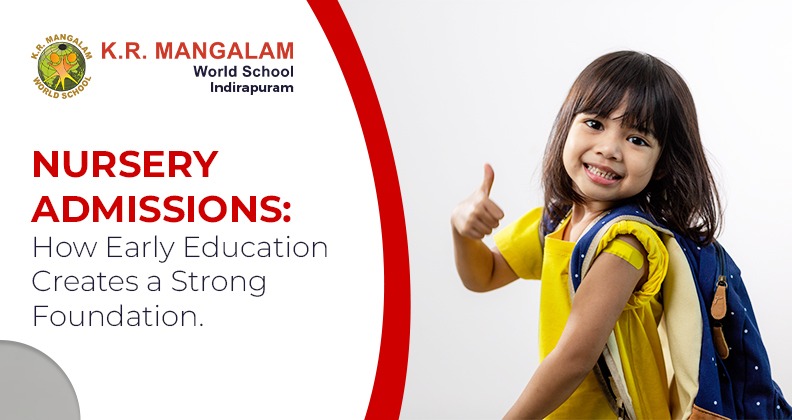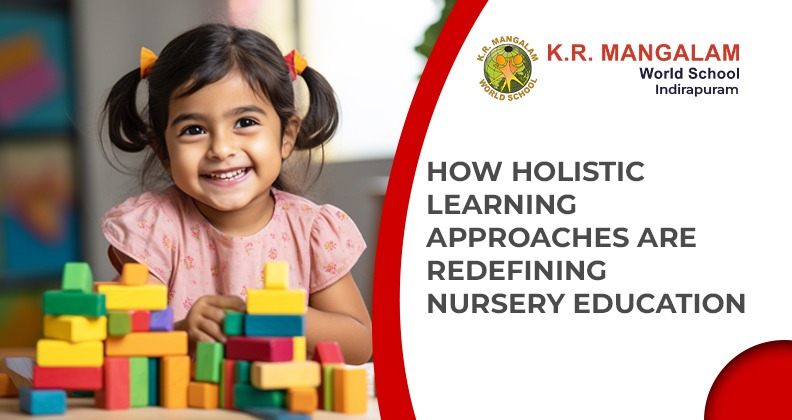Introduction:
The early years of a child’s life are a period of rapid brain development and endless curiosity. At K.R. Mangalam Indirapuram, the Nursery Admission in Indirapuram where these formative years lay the groundwork for future learning, emotional growth, and social interaction. Choosing the schools plays a pivotal role in ensuring that this foundation is not only strong but also nurtures the holistic growth of a child. Nursery admissions mark the beginning of this transformative journey, making it crucial for parents to understand how early education impacts their child’s future.
This article delves into the importance of nursery education, the role it plays in shaping young learners, and how a well-structured early learning program creates lifelong benefits.
About Us:
The early years at KR Mangalam are designed to spark curiosity and nurture potential. Our foundational stage blends fun with formality—tiny learners explore, play, and discover through sensory-rich environments, Montessori-style activity zones, and story-time corners. We give them room to grow—whether through creative painting, joyful outdoor play, or mini physical sessions like skating and ball games. Through gentle guidance, each child builds confidence, social skills, and a love for learning. Frequent parent–teacher meets, orientation camps, and “Welcome to School” events ensure a supportive transition. This nurturing environment underscores why we stand out among schools, offering not just admissions—but thoughtful beginnings that ignite lifelong growth.
-
The Significance of Early Education
Early childhood education is more than just an introduction to academics; it is a structured yet playful approach to developing essential skills in children aged three to five. During this period, the brain forms connections at an incredible pace, and children absorb knowledge through exploration, interaction, and imitation.
Key benefits of early education include:
- Improved language and communication skills
- Better cognitive and problem-solving abilities
- Development of emotional intelligence
- Early exposure to social norms and group learning
These advantages ensure that children who attend quality preschools transition smoothly into higher grades with better adaptability and enthusiasm for learning.
-
Why Nursery Admissions Matter
Many parents wonder why enrolling their children in nursery programs is essential when primary school lies just ahead. Nursery education is not about rote learning or academic pressure; it is about creating a foundation for lifelong success.
Nursery admissions offer:
- Structured routine: Children thrive in environments where there is consistency and rhythm, preparing them for future academic schedules.
- Social interaction: It is their first experience of building friendships outside the family circle.
- Exposure to learning environments: Classrooms, play areas, and interactive tools introduce them to concepts of collaboration and exploration.
This early start also helps parents identify their child’s strengths and areas requiring extra attention, ensuring timely intervention if needed.
-
Role of Preschools in Holistic Development
A preschool acts as a bridge between home and formal schooling. The focus is not only on academics but also on emotional and social growth. High-quality preschools adopt a child-centric approach, balancing structured lessons with creative play.
Core aspects of holistic development include:
- Cognitive growth: Introduction to numbers, colors, patterns, and logical reasoning.
- Motor skills development: Activities like drawing, clay modeling, and outdoor play enhance fine and gross motor skills.
- Emotional security: Teachers create a nurturing environment where children feel safe to express themselves.
- Creativity and imagination: Storytelling, music, and art sessions spark innovative thinking.
This comprehensive approach ensures that children step into formal education as confident, curious, and capable learners.
-
How Early Education Shapes Lifelong Learning
Research shows that early childhood experiences significantly impact a person’s future learning habits and personality. A strong foundation in preschool equips children with:
- Problem-solving skills: By encouraging exploration and trial-and-error learning.
- Resilience: Learning how to face challenges and bounce back from setbacks.
- Teamwork: Early collaboration builds communication and negotiation skills.
- Curiosity and love for learning: Play-based teaching fosters a natural desire to explore and ask questions.
These traits are invaluable not just in academic pursuits but in every aspect of life, from social interactions to professional growth.
-
Preparing Children for Formal Schooling
One of the primary goals of nursery education is to prepare children for the structured world of formal schooling. This preparation includes:
- Developing attention span: Engaging activities gradually increase their ability to focus.
- Understanding classroom etiquette: Raising hands, sharing, and following instructions become second nature.
- Basic literacy and numeracy: Recognizing letters, numbers, and phonics lays the groundwork for reading and mathematics.
Such readiness ensures that when children enter primary school, they are confident, prepared, and enthusiastic about the learning journey ahead.
-
The Role of Parents in Early Education
Parents are integral partners in their child’s early education journey. Active involvement in nursery admissions, orientation sessions, and ongoing communication with educators is crucial.
Ways parents can contribute include:
- Creating a learning-friendly home environment: Reading together, providing educational toys, and encouraging curiosity.
- Consistency between home and school: Reinforcing the same values and routines nurtures a sense of security.
- Emotional support: Celebrating small milestones builds a child’s confidence.
Preschools that involve parents in the learning process often see higher student engagement and better developmental outcomes.
-
Curriculum and Methodology of Quality Preschools
Leading preschools follow a curriculum that balances play with structured learning. Common approaches include:
- Montessori method: Emphasizes independence, hands-on learning, and self-paced progress.
- Play-way method: Focuses on experiential learning through games and creative activities.
- Integrated curriculum: Combines traditional methods with modern teaching aids and global perspectives.
Such innovative methodologies ensure that early education remains engaging, effective, and tailored to the unique needs of each child.
-
Importance of Safe and Stimulating Environments
A nurturing environment is key to building a strong foundation. Quality preschools offer:
- Child-friendly infrastructure with safe play areas
- Age-appropriate furniture and learning materials
- Secure premises with proper safety measures
- Teachers trained in early childhood care and education
When children feel safe, they are more open to exploring new experiences, expressing their feelings, and forming bonds with peers.
-
Introducing Values and Emotional Intelligence Early
Preschool is not just about ABCs and 123s; it is where children first learn about sharing, empathy, kindness, and respect for others. Emotional intelligence plays a major role in shaping a child’s personality and future relationships.
Storytelling, role-play, and group activities are often used to instill these values, making children emotionally resilient and socially responsible from a young age.
-
Technology Integration in Nursery Programs
Modern preschools integrate technology meaningfully to enhance the learning experience without overwhelming children. Digital storytelling, interactive whiteboards, and age-appropriate learning apps create a multi-sensory experience that keeps children engaged while developing their cognitive and digital literacy skills.
-
Building Communication and Language Skills
Language acquisition is most effective during the early years. Nursery programs introduce multiple modes of communication—verbal, non-verbal, and creative—through songs, rhymes, and group interactions.
Bilingual and multilingual exposure at this stage can further enhance cognitive flexibility, cultural understanding, and communication confidence.
-
Smooth Transition to Primary Education
A well-structured nursery program ensures that the transition from preschool to primary school is seamless. By the time children complete their nursery education, they are familiar with basic academic concepts, school routines, and social expectations, making them less anxious about the change.
-
Long-Term Benefits of Nursery Education
Investing in quality early education pays off for years to come. Children who attend nurturing preschools often show:
- Higher academic achievement
- Better social skills
- Enhanced creativity and critical thinking
- Stronger self-esteem
These attributes form the basis for future success, both in academics and life beyond school.
-
Choosing the Right Preschool
For parents, selecting the schools involves evaluating factors like curriculum, safety, teacher-to-student ratio, extracurricular opportunities, and feedback from other parents. At K.R. Mangalam Indirapuram, the best preschool in indirapuram where visiting the campus, interacting with educators, and understanding the school’s philosophy are essential steps in making the right choice.
Conclusion:
Nursery admissions are not just the first step in a child’s educational journey—they are the cornerstone upon which future learning, confidence, and personality are built. A nurturing preschool provides children with the tools, guidance, and environment they need to flourish academically, emotionally, and socially.
Choosing the right early learning program ensures that children embark on their educational journey with curiosity, resilience, and a love for learning that lasts a lifetime. For parents looking to provide the best start, a thoughtfully chosen preschool is the key to unlocking their child’s potential.
FAQs:
Q. 1 Why is nursery education considered a foundation for learning?
Ans. Early education nurtures cognitive, linguistic, and emotional skills, setting a strong base for future academic and personal growth.
Q. 2 What makes the nursery program different here?
Ans. The curriculum blends structured play, phonics-based learning, sensory activities, and early numeracy concepts to develop holistic skills.
Q. 3 Are parents involved in nursery learning?
Ans. Yes, parent–teacher interaction programs ensure active participation and smooth adaptation for children.
Q. 4 How are extracurricular activities introduced at this stage?
Ans. Creative art sessions, music exploration, storytelling, and outdoor activities help in developing social and motor skills.
Q. 5 Does early education include value-based lessons?
Ans. Yes, through role play, group interaction, and classroom activities, children learn essential values like sharing, kindness, and respect.
Q. 6 How do you ensure a smooth nursery admission process?
Ans. The admission process is parent-friendly with counseling sessions, interactive orientation, and transparent guidelines.












